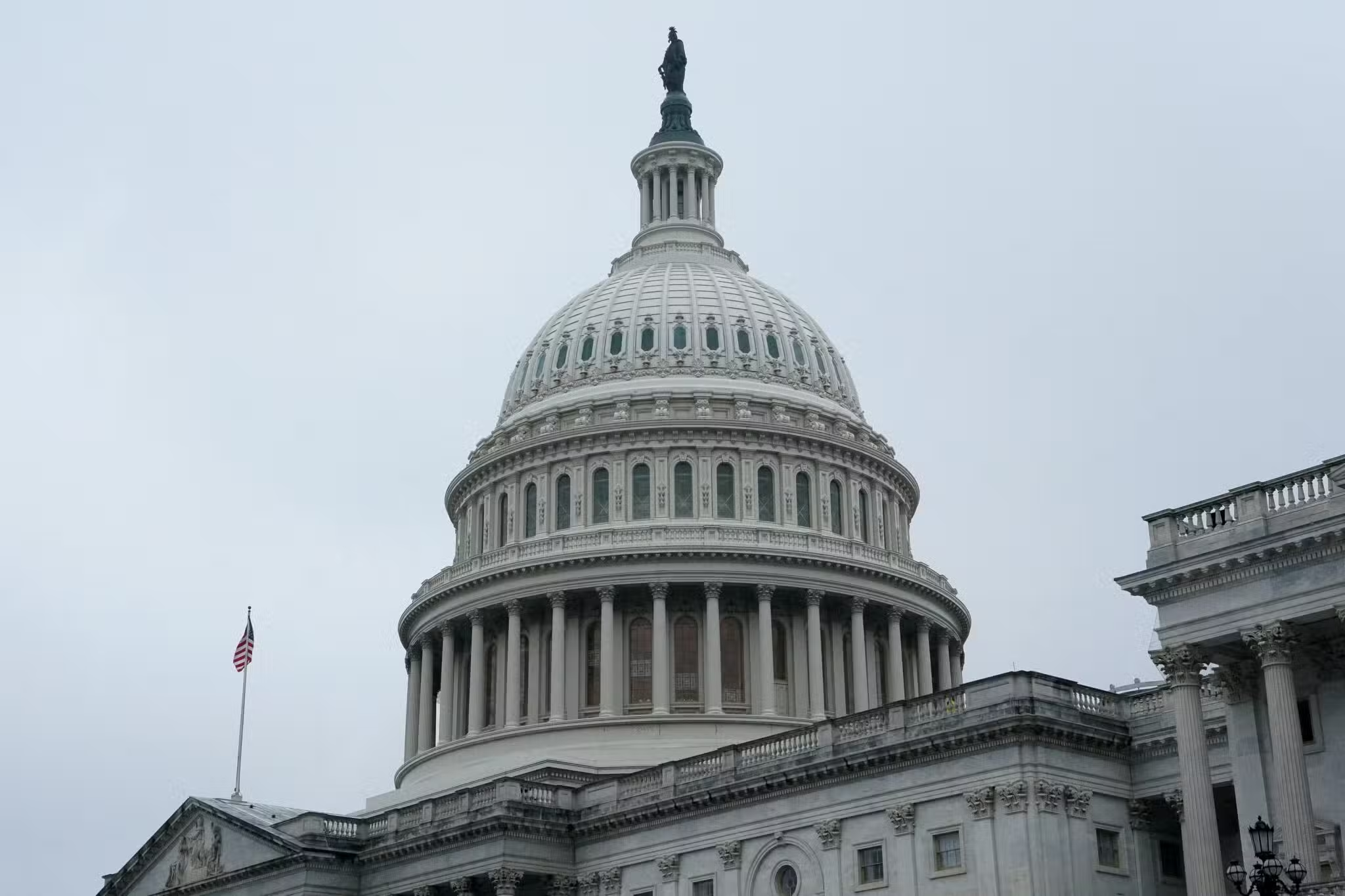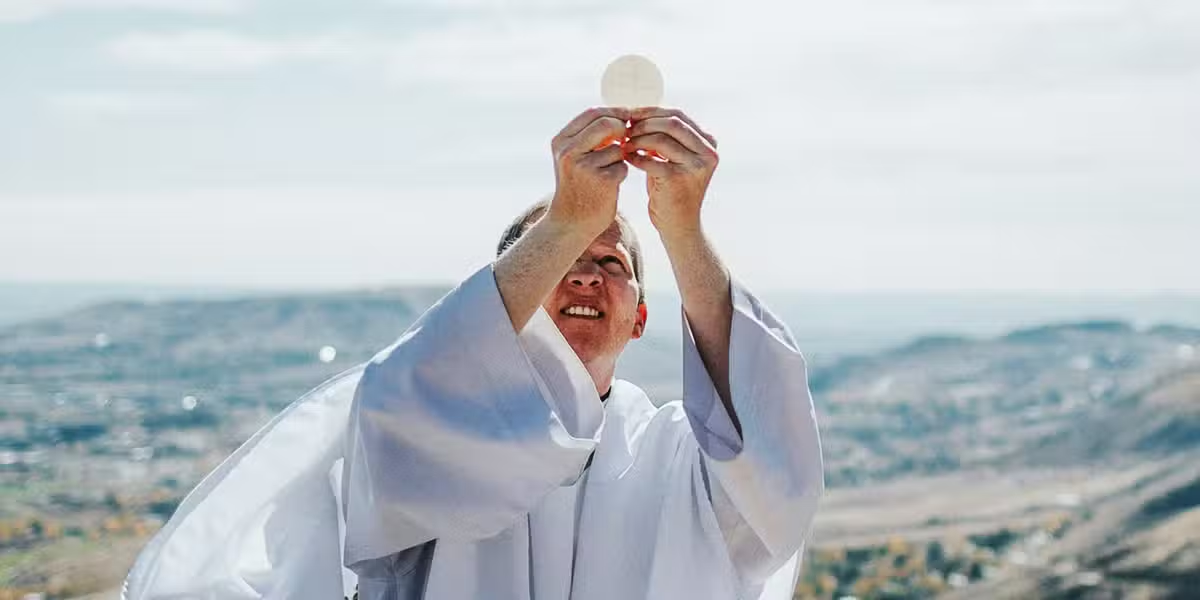SOUTHFIELD, Mich. (CNS) — As Russian military forces continued to assemble along the Russia-Ukraine border, U.S. President Joe Biden and other world leaders looked for a potential diplomatic solution to defuse tensions between Russian President Vladimir Putin and Ukrainian President Volodymyr Zelensky.
In the meantime, Detroit-area Catholic and Orthodox Ukrainian-Americans and their supporters called upon the most powerful weapon in their arsenal: prayer.
They gathered at St. Mary the Protectress Ukrainian Orthodox Cathedral in Southfield, outside of Detroit, for an ecumenical service Feb. 5.
It was an opportunity for the Ukrainian community to show a united front in supporting their homeland while calling on local leaders to stand in solidarity with Ukraine. About 46,350 Michigan residents are of Ukrainian descent.
“We represent our community’s efforts to be ready to step into action should the worst happen to our homeland in eastern Europe,” Mykola Murskyj, chairman of the Ukrainian-American Response Team in Detroit, which organized the vigil, told the congregation following an evening of prayer.
Murskyj urged people to “make sure we’re organized, prepared, raising awareness, making sure we’re all on the same page, uniting our community to stand with one voice together with Ukraine” before the conflict turns violent.
The response team has coordinated relief efforts for those who have been affected since Russia annexed Ukrainian territory in Crimea in 2014.
Auxiliary Bishop Donald F. Hanchon of Detroit told those gathered that the Latin-rite Catholic archdiocese stood in solidarity with the Ukrainian-American community.
“We unite as strong friends, brothers and sisters of those who are under pressure,” Bishop Hanchon said. “We pray our prayers, not just tonight but in the days to come, will be a consolation and an empowerment of those sisters and brothers, so far away. I also like to follow the example of holy Mary, Mother of God, the Protectress of Peace, the Queen of Peace.”
Ukrainian Catholic churches in Michigan are part of the Eparchy of St. Nicholas in Chicago.
Basilian Father Daniel Schaicoski, pastor of Immaculate Conception Parish in Hamtramck, discussed his parish’s connection with Ukraine with Detroit Catholic, the news outlet of the archdiocese.
He described the parish efforts to raise funds to support soldiers in eastern Ukraine, where a separatist movement emerged. Money has been used for medical supplies and winter clothing as well as to assist families of soldiers who have died.
Father Schaicoski said the situation on the Russia-Ukraine border is another development in a series of Russian incursions into Ukraine’s affairs since the 2014 Maidan Revolution, which saw Russia-backed Ukrainian President Viktor Yanukovych ousted from power.
The government under Zelensky has sought a more Eurocentric policy, steering the country away from Russian influence. In response, pro-Russia factions in Ukraine’s south and east — backed in part by Russia — launched separatist movements that have resulted in the Ukrainian government losing control of the Crimea and Donbas regions.
Following prayers during the Feb. 5 vigil, office holders and political leaders discussed the need for an American response to the situation in eastern Europe.
“We hear so many of our American brothers and sisters on the Democratic side of the aisle, the Republican side of the aisle, the independents, the libertarians, asking the same question: ‘Why is this our fight?'” asked Rocky Raczkowski, chairman of the Oakland County Republican Party.
“But when you look at the men and women who work at the General Motors plant in Warren or the Ford plant in Sterling Heights, there are Ukrainian parts in those vehicles,” he said. “When you look at what Putin said about NATO, it’s not just about Ukraine’s freedom, it’s about a free and prosperous Europe.”
Rep. Andy Levin, D-Mich., who serves on the House Foreign Affairs Committee, reported on discussions in Washington and what he believes needs to be done to defend Ukraine’s sovereignty and ensure peace.
He recounted Ukraine’s history, from its attempts to break away from the Russian Empire following the 1917 February revolution, including the 1932 Holodomor Terror Famine, in which 3.5 million to 7.5 million people, mostly Ukrainians, died and its transition to democracy after the ousting of Yanukovych.
Russian and Western leaders dispute the cause of the current situation, from the potential expansion of NATO to Ukraine to the presence of Western forces in the lands of former Russian allies under the Soviet Union. But Father Schaicoski said Ukrainians see Putin’s most recent maneuvers as another attempt to project power onto Ukraine.
“Russia has a kind of identity crisis without Ukraine,” Father Schaicoski said. “Really, Russia is a younger brother to Ukraine. Christianity, civilization came to Kiev well before it came to Moscow. Moscow actually is a branch out from Kiev, from Ukraine.
“But for Putin, it’s not about Ukraine,” he said. “He already has his feet wet in Ukraine, in eastern Ukraine and the Crimea. So he’s not looking at Ukraine. He’s looking at Poland, the Baltics, Romania, Moldovia.”
Father Schaicoski is skeptical Russia could fully take over Ukraine, and for that reason he is hopeful for peace.
“If Russia wants to take over Ukraine, they don’t need 100,000 troops; they need a million soldiers. Ukrainians are fighters. The Russians have more missiles, more planes, they can take Ukraine out by air, but they’ll never take over Ukraine,” he said.
“The people in Ukraine right now are creating ‘people’s armies’ in every village. So if the Russians cross the main line, they will have to fight these people. Putin knows it won’t be easy, so I don’t think he’s going to invade. We want peace, because we don’t want to hurt the Russians, which is what will happen if they invade.”
While the potential for conflict in Ukraine still remains, Father Schaicoski called for prayers for peace, saying “no war is going to be good.”
“For now, the best thing is to pray for peace. Because we know every prayer is heard.”
By Daniel Meloy | Catholic News Service







News & Commentary
Detroit-area Ukrainian Americans pray for peace in their homeland
SOUTHFIELD, Mich. (CNS) — As Russian military forces continued to assemble along the Russia-Ukraine border, U.S. President Joe Biden and other world leaders looked for a potential diplomatic solution to defuse tensions between Russian President Vladimir Putin and Ukrainian President Volodymyr Zelensky.
In the meantime, Detroit-area Catholic and Orthodox Ukrainian-Americans and their supporters called upon the most powerful weapon in their arsenal: prayer.
They gathered at St. Mary the Protectress Ukrainian Orthodox Cathedral in Southfield, outside of Detroit, for an ecumenical service Feb. 5.
It was an opportunity for the Ukrainian community to show a united front in supporting their homeland while calling on local leaders to stand in solidarity with Ukraine. About 46,350 Michigan residents are of Ukrainian descent.
“We represent our community’s efforts to be ready to step into action should the worst happen to our homeland in eastern Europe,” Mykola Murskyj, chairman of the Ukrainian-American Response Team in Detroit, which organized the vigil, told the congregation following an evening of prayer.
Murskyj urged people to “make sure we’re organized, prepared, raising awareness, making sure we’re all on the same page, uniting our community to stand with one voice together with Ukraine” before the conflict turns violent.
The response team has coordinated relief efforts for those who have been affected since Russia annexed Ukrainian territory in Crimea in 2014.
Auxiliary Bishop Donald F. Hanchon of Detroit told those gathered that the Latin-rite Catholic archdiocese stood in solidarity with the Ukrainian-American community.
“We unite as strong friends, brothers and sisters of those who are under pressure,” Bishop Hanchon said. “We pray our prayers, not just tonight but in the days to come, will be a consolation and an empowerment of those sisters and brothers, so far away. I also like to follow the example of holy Mary, Mother of God, the Protectress of Peace, the Queen of Peace.”
Ukrainian Catholic churches in Michigan are part of the Eparchy of St. Nicholas in Chicago.
Basilian Father Daniel Schaicoski, pastor of Immaculate Conception Parish in Hamtramck, discussed his parish’s connection with Ukraine with Detroit Catholic, the news outlet of the archdiocese.
He described the parish efforts to raise funds to support soldiers in eastern Ukraine, where a separatist movement emerged. Money has been used for medical supplies and winter clothing as well as to assist families of soldiers who have died.
Father Schaicoski said the situation on the Russia-Ukraine border is another development in a series of Russian incursions into Ukraine’s affairs since the 2014 Maidan Revolution, which saw Russia-backed Ukrainian President Viktor Yanukovych ousted from power.
The government under Zelensky has sought a more Eurocentric policy, steering the country away from Russian influence. In response, pro-Russia factions in Ukraine’s south and east — backed in part by Russia — launched separatist movements that have resulted in the Ukrainian government losing control of the Crimea and Donbas regions.
Following prayers during the Feb. 5 vigil, office holders and political leaders discussed the need for an American response to the situation in eastern Europe.
“We hear so many of our American brothers and sisters on the Democratic side of the aisle, the Republican side of the aisle, the independents, the libertarians, asking the same question: ‘Why is this our fight?'” asked Rocky Raczkowski, chairman of the Oakland County Republican Party.
“But when you look at the men and women who work at the General Motors plant in Warren or the Ford plant in Sterling Heights, there are Ukrainian parts in those vehicles,” he said. “When you look at what Putin said about NATO, it’s not just about Ukraine’s freedom, it’s about a free and prosperous Europe.”
Rep. Andy Levin, D-Mich., who serves on the House Foreign Affairs Committee, reported on discussions in Washington and what he believes needs to be done to defend Ukraine’s sovereignty and ensure peace.
He recounted Ukraine’s history, from its attempts to break away from the Russian Empire following the 1917 February revolution, including the 1932 Holodomor Terror Famine, in which 3.5 million to 7.5 million people, mostly Ukrainians, died and its transition to democracy after the ousting of Yanukovych.
Russian and Western leaders dispute the cause of the current situation, from the potential expansion of NATO to Ukraine to the presence of Western forces in the lands of former Russian allies under the Soviet Union. But Father Schaicoski said Ukrainians see Putin’s most recent maneuvers as another attempt to project power onto Ukraine.
“Russia has a kind of identity crisis without Ukraine,” Father Schaicoski said. “Really, Russia is a younger brother to Ukraine. Christianity, civilization came to Kiev well before it came to Moscow. Moscow actually is a branch out from Kiev, from Ukraine.
“But for Putin, it’s not about Ukraine,” he said. “He already has his feet wet in Ukraine, in eastern Ukraine and the Crimea. So he’s not looking at Ukraine. He’s looking at Poland, the Baltics, Romania, Moldovia.”
Father Schaicoski is skeptical Russia could fully take over Ukraine, and for that reason he is hopeful for peace.
“If Russia wants to take over Ukraine, they don’t need 100,000 troops; they need a million soldiers. Ukrainians are fighters. The Russians have more missiles, more planes, they can take Ukraine out by air, but they’ll never take over Ukraine,” he said.
“The people in Ukraine right now are creating ‘people’s armies’ in every village. So if the Russians cross the main line, they will have to fight these people. Putin knows it won’t be easy, so I don’t think he’s going to invade. We want peace, because we don’t want to hurt the Russians, which is what will happen if they invade.”
While the potential for conflict in Ukraine still remains, Father Schaicoski called for prayers for peace, saying “no war is going to be good.”
“For now, the best thing is to pray for peace. Because we know every prayer is heard.”
By Daniel Meloy | Catholic News Service